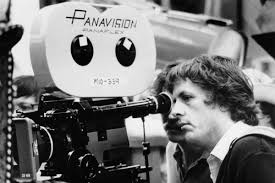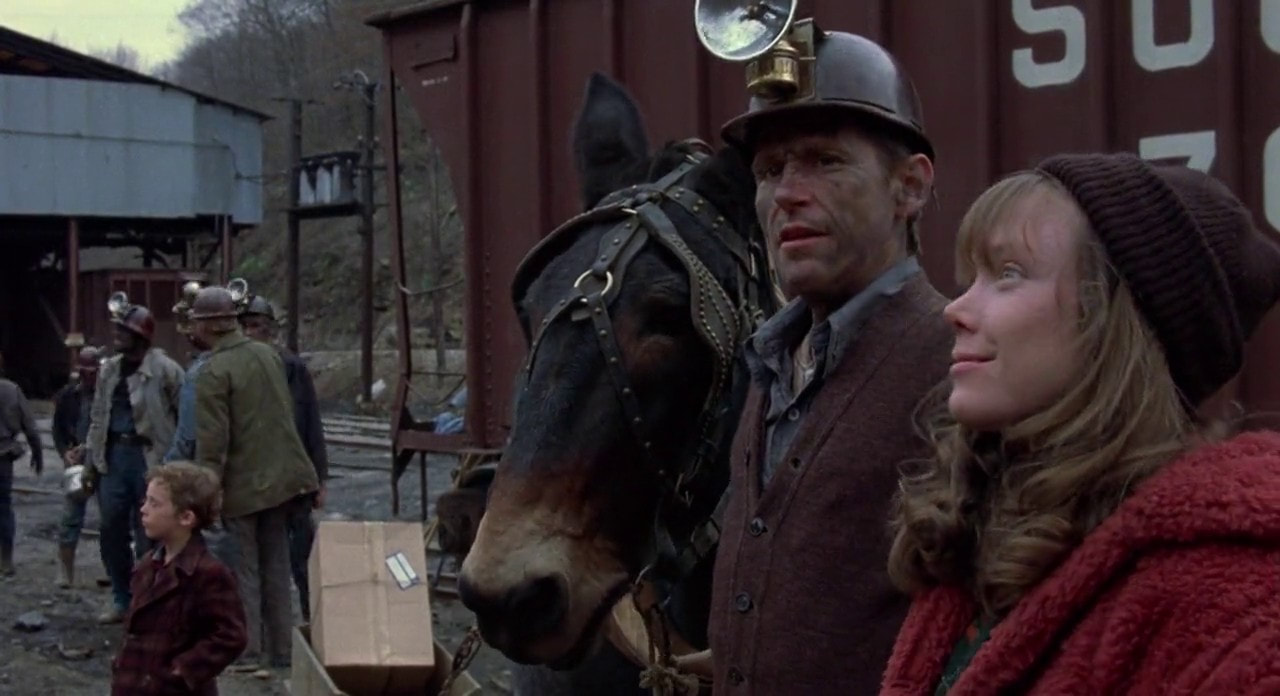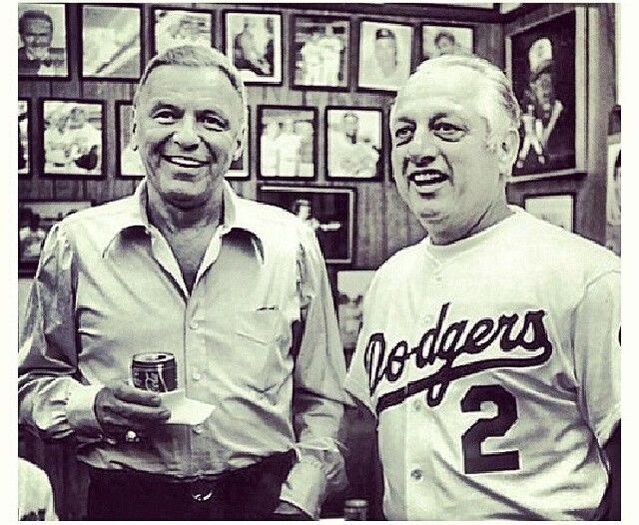 Michael Apted, young director Michael Apted, young director (I was gearing up to write something about my despicable ex-neighbor from Queens, who is trying to take the country down with him. Then I read the obits of two people who enriched my life, in several senses of the word, and realized I need to pay homage to Michael Apted and Tommy Lasorda.) * * * I was afraid of what Hollywood would do with Loretta Lynn’s book, and her life, and her roots in Eastern Kentucky. Having been the Times’ Appalachian correspondent, I was blessed to get to know her and be asked to write her autobiography, and have her tell me great stories that made the book “Coal Miner’s Daughter” so easy to put together. Then the book was marketed to Hollywood. From a vast distance, I heard rumors that this producer or that director wanted to put out a steamy version, a Beverly Hillbillies knockiff, of her colorful life. But then, way out of the loop, I heard that the Hollywood gods had lined up producer Bernard Schwartz….and screenwriter Tom Rickman….and British director Michael Apted. I exaggerate sometimes that when I say that I was invited to an early private screening in Manhattan and brought a fake mustache and a wig and a raincoat I could put over my head like gangsters do when they are arraigned. I did fear the worst. Then the movie began in the little screening room and I saw Levon Helm, as Loretta’s daddy, coal dust all over his face and hands, coming home from the mine and being met by his daughter, played by Sissy Spacek, and instead of goofus cartoon figures they were tender father and daughter, giving thanks that he had survived another shift underground. I could breathe. No disguises necessary. “The good guys won,” Rickman told me later. Michael Apted, best known for his “Up” documentaries, was a principal good guy. He has died at 79. https://www.nytimes.com/2021/01/08/movies/michael-apted-dead.html I got to meet Apted a few months later at the “grand opening” in Nashville, where my wife and I were treated like one of the gang. Levon, Sissy and Loretta (if I may call them by their first names) gave an impromptu concert at the hotel, and the next day “we” took a chartered bus up to Louisville. I chatted with Apted for a few minutes and told him how much I loved the movie, how fair it was to the region and how it lived up to what we had tried to do with her book. I still remember one sentence: “I am no stranger to the coalfields.” Later, I looked it up and saw he was born in posh Aylesbury and grew up in London, but the point was, Michael Apted was a serious film-maker who traveled and learned and listened. For a more distinct Appalachian feel, he incorporated some locals into the movie, just as Robert Altman did in the movie “Nashville.” I never met Apted again, but I am eternally gratefully to him and Schwartz and Rickman and the talented performers. * * * I knew Tom Lasorda better. I met him in the early 80s when he was already a celebrity manager with his monologues about “bleeding Dodger-blue blood.” He made it his point to know the New York sports columnists and including us as bit actors in his own personal production..
One time he told me that “Frank” had been at the game the night before. I guess I looked blank and he sneered at me and shouted, “Frank! Frank! Frank Sinatra!” Wherever he was, Lasorda’s clubhouse office might be home to show-biz or restaurant types, plus Mike Piazza’s father, Vince, Lasorda’s childhood pal. One time, in a big game in LA, the Dodgers had a lead in the late innings and there was a commotion in the dugout as Jay Johnstone ran out to right field and waved off some directive. Later we asked Lasorda what happened, and he said he tried to send Rick Monday out to play defense – a normal tactic -- but Johnstone had run past him, saying, “F--- you, Tommy, I’m not coming out!” Lasorda told it -- laughing, proud of Johnstone’s stand – particularly since it had not cost the Dodgers. I was working on a book with Bob Welch, the pitcher and my late friend, about his being one of the first athletes to go through a rehab center for alcoholism. I knew Lasorda had made a brief visit to the center during Bob's family week, and I wanted his recollections, but Lasorda was evasive. Finally, on the road, he agreed to talk to me in his hotel suite, blustering, raising his voice, as if somebody were listening in the next room. “He’s not an alcoholic!” Lasorda shouted. “He can take a drink or two! He just has to control it!” – totally against what recovering addicts know to be true. I will give Lasorda credit for giving me the time…and his point of view. Whenever we met, he always said hello. Whatever his personal life was like, he loved wearing Dodger Blue. In his bombastic showboat way, he incorporated peripheral types, like a New York sports columnist, into his world, and he made us enjoy our little part of it. * * * Richard Goldstein and Tyler Kepner have told many great tales of Lasorda’s life: https://www.nytimes.com/2021/01/08/sports/baseball/tommy-lasorda-dead.html?searchResultPosition=1www.nytimes.com/2021/01/08/sports/baseball/tommy-lasorda-dead.html?searchResultPosition=1 https://www.nytimes.com/2021/01/08/sports/baseball/tommy-lasorda-dodgers.html?searchResultPosition=1
Randolph
1/9/2021 01:26:51 pm
George, 1/9/2021 03:10:53 pm
Randolph's description of George as a human hub is as photographers say, tack sharp. It reminded me of a photo I took while on a bus slowly moving down a very narrow street in a small Mexican town. There were so many telephone and electrical wires attached to a pole that it could have been a communications center.
Gene Palumbo
1/9/2021 03:31:37 pm
George,
George Vecsey
1/9/2021 04:53:04 pm
Thank you-all for these three comments. I do have to share my little secret which is that writing is one of the favorite things I do -- like going out to shoot hoops or riding my bike or swimming. I love the process. As Obama said after sinking that impromptu shot from the corner -- "It's what I DO!" (And, man, do I wear out that phrase.) I love sharing old stories and adventures, at the risk of being a bore.. As you can tell, I feel guilty about not writing about the horrors of recent days but like most people I have been transfixed. My friend in Madison, WI, asked this morning whether I am thinking about weighing in. I'm thinking!I'm thinking! But then I realize two giants I met, however superficially, had just passed, and attention must be paid. I'm stuck with my headline about The Fool: "I Tried to Tell You." Plus, the great NYT columnists, so many of them, are writing about him that I am numb. But I'd love to open a format for this little band and me, so soon. I'm sure this is an ongoing subject. Thanks for caring, GV
bruce
1/9/2021 05:26:29 pm
george,
Altenir Silva
1/10/2021 10:33:46 am
Dear George
George Vecsey
1/10/2021 10:49:27 am
Dear Altenir: because you have created several movies in Brazil, you know the territory. Apted was essentially a maker of documentaries, at heart -- meaning, let the people speak. I think directors do insert their point of view, but part of the story. (Altman has some Democrat types busting on Nixon during "Nashville" -- comments at the fringe of the room, etc.) Clint is interesting. I'll never feel the same about him after his ludicrous insult to Obama, but he has made three excellent movies in his "old age" --" Invictus," about Mandela and rugby; "Gran Torino" about American values with great respect for some recent Asian immigrants; and "The Unforgiven," a morality tale, however bloody, maybe my second favorite movie.All of these from somebody who could disrespect a great human being. GV
Altenir Silva
1/10/2021 07:24:46 pm
Dear George,
bruce
1/10/2021 11:01:39 am
george,
George Vecsey
1/10/2021 05:38:46 pm
Bruce: good memory. "The Third Man" is one of those Rosebud things. My parents got a babysitter for the rest of the brood and took me to see that movie, in the evening, when I was 10 or 11, They explained the history/politics....but it was the idea of being exposed to serious subject like that. A few years ago, we were watching a very long and boring NFL playoff (aren't they all?) when some 50-something clicked the dial and came up with Welles and Cotton in Vienna....."Best movie ever," I said. And we watched it instead of football. So much fun to turn others on to that classic. GV
bruce
1/10/2021 06:08:52 pm
george, Comments are closed.
|
Categories
All
|











